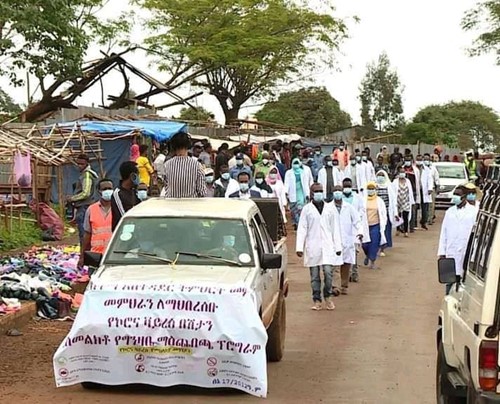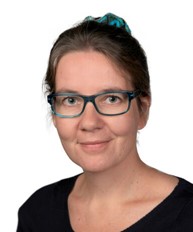News
Over two decades of community-managed project implementation and still pioneering the way

News
Entering its fourth phase, the “COWASH way” of improving access to water and sanitation in rural Ethiopia continues its successful approach, inspiring others to follow its example
If you are working on water, sanitation and hygiene in Ethiopia today, chances are you are applying tools and approaches pioneered by a 27-year-old bilateral development cooperation between the Governments of Finland and Ethiopia. The long-standing community-led water, sanitation and hygiene (COWASH) project has been driving rural WASH service delivery through its innovative CMP method. Promoting community empowerment, transparency and ownership, CMP involves community-led management of project implementation, finance and procurement from beginning to end.
“In CMP, the communities are the project managers of infrastructure development. They plan it, facilitate the financing, and contribute up to 30% of the cost. I am very proud that people are not expecting the government to do everything. The communities are leading the process. They are ready to implement, finance, operate and they can do it – this is a big change, and I am very proud as COWASH planted the seed.” says COWASH Team Leader Arto Suominen.
The very close technical and financial assistant of the Government of Finland to support universal access to WASH services through community-led concept has enabled significant number of rural populations to access clean and safe water supply. I feel that projects like COWASH have paramount importance in the pledge towards meeting the SDG goals associated with water supply and sanitation in rural areas and must be scaled up to reach out more rural woredas.
Dr Negash Wagesho, State Minister, Ministry of Water, Irrigation & Energy
The Government of Finland has been supporting WASH programmes in various iterations for 27 years in Ethiopia, and the development cooperation relationship goes back already to 1994 with Arto laying the groundwork. His colleagues Yohannes Melaku, the “Ethiopian Abat (father) of CMP”, and COWASH monitoring, evaluation and learning Specialist Abebaw Getachew bring their own 21 and 9 years of experience, respectively. That’s a combined 57 years of invaluable knowledge and practice in making WASH more accessible in rural Ethiopia.
Launching its fourth phase in April and running for four years, every stage of COWASH involves a new kind of thinking without losing the momentum gained in the prior phase. In this phase, NIRAS takes over implementation from Ramboll with whom we collaborated on phase 3.
water schemes in the community, school and health centres built
school and health latrines built
household latrines built
community members, students, teachers, health workers benefited
“This time we are shifting from quantity to quality,” Arto explains. “Early on, the aim was to help as many as possible with WASH services. Now the water supply is close to 80%, but people still need to walk long distances for access and all the services are not climate resilient or totally inclusive of all needs. Safely managed water coverage in Ethiopia is about 20% so we need to improve the quality and the supply chain to ensure a higher level of maintenance. At the same time, we will go to more remote areas where people are still without service.”
Phase 4 of COWASH is planned to be implemented in 105 districts (or woredas), representing more than 10% of all rural districts of Ethiopia and moving from five to six regions (Amhara, Tigray, Oromia, Benishangul-Gumuz, the Southern Nations and Nationalities Peoples’ Region and Sidama). In addition to improved quality, functionality and monitoring of the rural water supply, there will be an increased focus on institutional WASH, which has been lagging behind. Although new schools and health facilities have water, latrines, hand washing, menstrual hygiene services, older schools and health facilities – of which there are about 60,000 in Ethiopia – still have less than 50% WASH coverage.
COWASH is a project very close to the community addressing its real needs through community participation and creation of genuine community ownership. In COWASH, the community themselves spell out their needs, design, implement, manage and follow up the project. Due to its unique approach of genuine community participation and ownership, COWASH projects are more sustainable than others.
Dr. Beshah Mogessie, Federal Water Development Commission, Commissioner.
Safely managed sanitation is another important area. In Ethiopia, 30 million people (30% of the population) still practice open defecation. The COWASH team intends to integrate sanitation more with water supply and related services. Arto points out that sanitation is actually a supply chain issue. “If we can increase the number of active private sanitation entrepreneurs, we can significantly improve the situation.”

Living up to its pioneering role, inclusivity is an area where COWASH has led the way in past years. The project has been a pioneer in empowering persons with disabilities to be part of the development process as equal partners to ensure disability inclusive water schemes and sanitation. “We are very proud that we have alerted the WASH sector that needs of persons with disabilities are met through inclusive facilities and they are also included in the management and operative positions of the water scheme management so that they can ensure that their special needs are met in design and facility development. But improvements are still needed and we will focus on rehabilitating old and creating new water schemes to be more inclusive,” Arto explains. Climate change resilience and gender issues, such as menstrual hygiene management and gender-based violence, are also areas that need to be more broadly integrated. They, like disability, need to be viewed not as “add-ons” but are rather mainstreamed into every WASH initiative. Two specialists in these areas join the COWASH phase 4 team.
No one left behind: ensuring people with disabilities have access to and are involved in water and sanitation planning and management. Read more ...
In times of crisis - a chance to shine
Phase 3 of COWASH was due to end in June 2020, smack in the middle of a pandemic that required rigorous handwashing and access to clean water. The project was given an extension to bridge the gap until the launch of phase 4 in April 2021 with extra resources targeted at raising awareness about COVID-19, the importance of hand washing, and increasing soap production, all barriers to stop virus spreading.

“We did not waste any time acting!” says Communications Specialist Melaku Tekola. “Under lockdown, we used the time to prepare capacity building materials. COWASH’s regional communications network rolled the message out via channels like radio and vans with loud speakers. We issued COVID directives to ensure compliance across regions. The federal TA and three regions of Amhara, Benishangul-Gumuz and Tigray carried out procurements for COVID-19 emergency response by using savings caused by pandemic restrictions issued by the Government. The total amount of procurements carried out was Birr 6,255,504.
In addition to COVID, there were armed conflicts in Tigray and the Metekel zone. “We jumped into those emergencies with water tracking and used a contingency fund to fix destroyed infrastructure,” Melaku explains. “The Government of Finland was very supportive and gave approval for emergency use of funds in record time.”
Phase 4 of COWASH will be officially launched on 27 May with an all-inclusive kick off meeting with relevant stakeholders and partners. The COWASH plans, objectives and deliverables will be shared and the project document handed to the regions, later to be detailed in annual core plans and specific activities. Following the kick off meeting, regional partners and representatives will be briefed and roadmaps be developed.
The COWASH team is excited to replicate the strength underscored in the previous phase with renewed energy and passion. It is our hope that, this phase will be a particular success in addressing the critical needs of the community we work in water, sanitation and hygiene in community, health and school settings.
COWASH has been an important player in Ethiopia not only in time of crisis. Since its inception, the project has been supporting the institutional and initiatives spearheaded by the Ministry of Water, Irrigation and Energy.
“Arto was part of the team drafting the country’s National WASH Implementation Framework, and we are members of the multi-stakeholder forum, which conducts a joint technical review of WASH developments and makes recommendations on what undertakings the government should take in the sector. We also sit in a variety of working groups – such as irrigation and market-based sanitation – where we share our experience in the sector,” Melaku notes.
COWASH was the first project of its kind to get funding from the regions, which is matched by the Finnish government, allowing the capacity development component to come into play. This means that COWASH is simply supporting the regional government WASH projects to make them sustainable.
Today, others are following COWASH’s example.
“Following our lead, a $700 million multi-donor project is currently getting 20% from the regional governments,” Melaku notes, adding with pride, “The COWASH way of doing things has been replicated in other donor projects simply because it’s been so successful.”
“What keeps us inspired in COWASH are the happy faces with water”, Arto says.

Mikaela Kruskopf
Senior Consultant
Helsinki, Finland

